The young men were giddy to meet us. Three of them crowded around the computer screen, playfully pushing against one another, laughing.
“This is the first time I applied to leave Gaza” said Anas Jnena. “It was really hard on me to not get out at least one day. I live in a prison.” The young men are writers, members of We Are Not Numbers, a group of 300 young Palestinians in Gaza, the West Bank, and Lebanon who are sharing and celebrate their stories, with experienced authors mentoring the youth.
We were a delegation of seven staff aides for members of Congress, and ten citizen “accompaniers” — four from Santa Cruz County — organized by Rebuilding Alliance. We were in Jerusalem, meeting them via teleconference because State Department policy states that “U.S. government employees are not allowed to travel to Gaza and are restricted from traveling close to the Gaza border areas.” The Government of Israel did not provide clearance in time for most of the speakers to leave Gaza to join us, and some were denied outright without being given a reason.
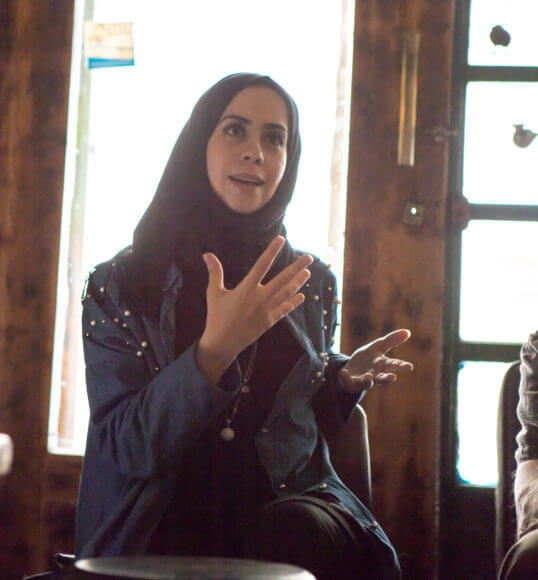
Then, two women entered our conference room. The young men saw them via computer camera. “Tarneem, we envy you!” Writer Tarneem Hammad had been granted permission by the Israeli government to leave Gaza for the first time in her 23 year life—and just for eight hours. Mrs. Najah Ayash, Executive Director of the Women’s Program Center – Rafah, was also granted the one-day permit.
Gaza is a narrow strip of land alongside the Mediterranean Sea. Imagine an area from Westside Santa Cruz to Watsonville (about 25 miles), and three to seven miles inland—one third the size of Santa Cruz County—with 2 million people. That would be ten times the 200,000 residents we have in the four cities and urban areas of Santa Cruz County—in that same space. (See this map photo, from the website Gaza Everywhere)
How did they get there? Seventy percent are refugees and descendants from 1948, when Israel won its first war and forced 750,000 people off their land and villages, and also from 1967 when Israel pushed Egypt out of Gaza, and pushed Jordan out of East Jerusalem and the West Bank. Others are fishermen, famers, shopkeepers, manufacturers who are from this historic Palestinian seaside land. Many Gazans worked in Israel and in Egypt until Israel tightened, then closed, a militarized perimeter around Gaza in 2007. Gaza had a stronger economy than the West Bank not long ago. Now unemployment is over 40 percent, with 60 percent for youth, defined as people under the age of 30.
The Israeli military confines the 2 million Gazans with parallel barbed-wire barriers separated by a 300 yard land moat, surveillance sensors, constant patrols bearing shoot-to-kill orders, and only two exit check-points, one (Erez crossing) where Israel controls the border, the other (Rafah crossing) which Egypt controls.
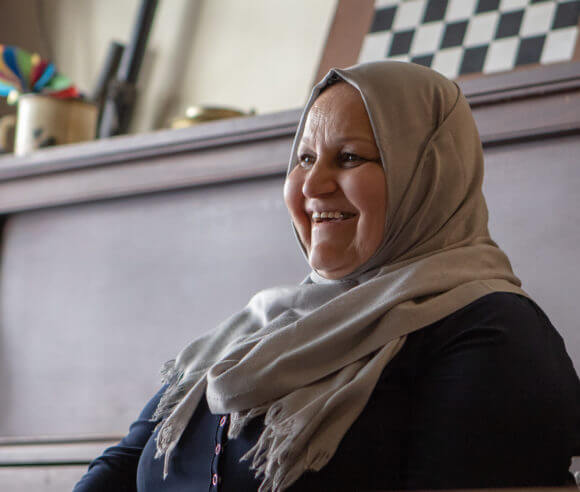
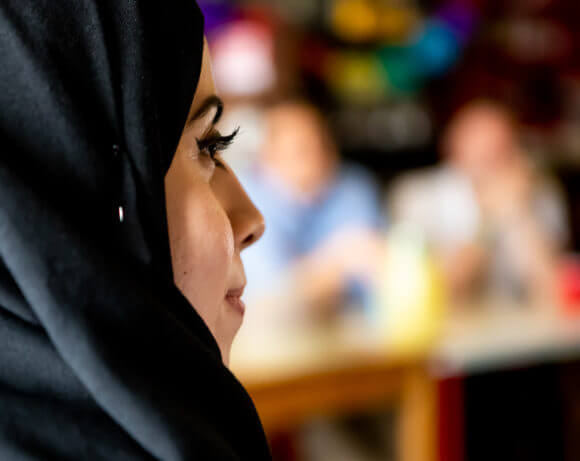
Matthias Schmale, Gaza Operations Director for UNRWA, the UN Relief and Works Agency for Palestinian Refugees, told our delegation that hundreds of women are denied travel to Israel for needed breast cancer treatments. Dr. Yasser Abu-Jamei, Executive Director of the Gaza Community Mental Health Programme has practiced psychiatry in Israel, and briefed Congress in person in 2015. Still he was denied permission to leave Gaza to meet with us. He reported that in December a child with a bullet in his knee was denied medical travel to Israel “for security reasons.” As a result, the child’s entire leg had to be amputated.
Dr. Yasser Abu Jamei understands the traumas many of his patients face who have lost of relatives to Israeli airstrikes during the course of three wars in less than ten years. In an interview with Abu-Jamei, the Journal of Palestine Studies wrote,
“Dr. Yasser Abu Jamei, knows the problem firsthand: during Israel’s Operation Protective Edge (OPE), the fifty-day war on Gaza in the summer of 2014, an airstrike killed twenty-eight members of his extended family, including nineteen children, as they broke their Ramadan fast. It was the largest loss of life within a single family at that point in the war. Abu Jamei continued his work at GCMHP, providing mental health support to the community both during and after the onslaught.”
Dr. Abu Jamei reported electricity service is off 20 hours each day—in medical centers, in schools, everywhere. Said writer Anas Jnena, “Each day I have to plan all my life in four hours—laundry, charging phones and computers. I have to ask people I want to visit, when will power be on in their neighborhood?”
“What do you do for fun?” We asked Tarneem, the young woman. “I love the beach. It gives me comfort when I go there. I put up with the pollution. I cannot touch the water.” Forty Olympic-size pools of sewage flow into the Mediterranean Sea every day because electricity is not available to run sewage treatment facilities, and facilities were destroyed by Israeli military attacks.
Children bear the situation. Tameem reminded us that 11 year old children have lived through three wars. The psychiatrist Abu Jamei said Israeli policy is that sick children are required to have an adult over 60 accompany them to hospital in Israel, therefore, no parents. “Gaza teaches me I have to work on myself as hard as I can” declares Tameem. And Anas: “All the surroundings make you afraid to hope. If you want to get out and get a degree in international relations, you don’t have to worry about filling out the application, but whether the border will be open for me to go out. I hope I don’t have to struggle with this forever.”
UNRWA provides the basic government services for refugees that government would provide—in Gaza, 275 schools for 272,000 children, 22 primary health centers, food aid for 50 percent of the people. This spring the Trump administration it has frozen $305 million from its $360 million budget for UNRWA, placing it ‘under review’ while making it clear they should not expect further U.S. funding this year. From the UNRWA website, one can see that the U.S. was UNRWA’s largest donor in 2017. UNRWA Officials say schools will not be able to open in September without this funding. 272,000 children will have nowhere to go, 9,000 teachers will be unemployed, alongside hundreds of thousands of already unemployed Gaza residents.
The Trump administration also froze emergency food assistance in Gaza for the rest of 2018.
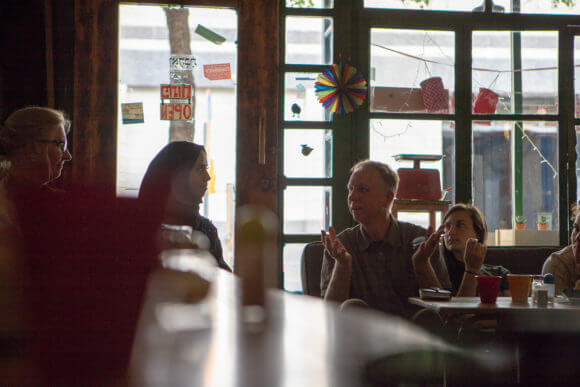
Matthias Schmale was blunt: “it is a major nightmare when the United States government notified UNRWA that it will not grant emergency food money this year.”
Schmale observed the March of Return, in which thousands of Gazans have demonstrated at the barrier built by Israel. “It is a mistake to view the events only through the lens of whether Hamas is involved or not. Many people want to express their worries and their dreams nonviolently.” To date, since March 30 the Israeli military killed more than 1oo, including eight children, and wounded over 3,400 with live ammunition who were near the border fence during the Great March of Return. Israel continues its policy to use live bullets against people approaching the military perimeter containing Gaza.
Anas from We Are Not Numbers told us he went to one Friday demonstration with a sign, “Shooting a Palestinian in a fish bowl is not victory.” He reported, “I saw burning tires and boys hurling stones that never reach the soldiers, thrown in deep frustration.”
We also heard from Ziyad al-Abed, Executive Director of the El Amal Rehabilitation Society, which runs the only school for people with hearing disabilities in the southern half of Gaza, funded by USAID. USAID eliminated this funding in the recent budget, two years into a contracted five-year commitment. “Now I have 30 people working without salaries.” And no funds to transport blind and deaf children to training programs.
“Please help us” said Dr. Yasser Abu Jamei, looking directly at us. “Please speak up.”
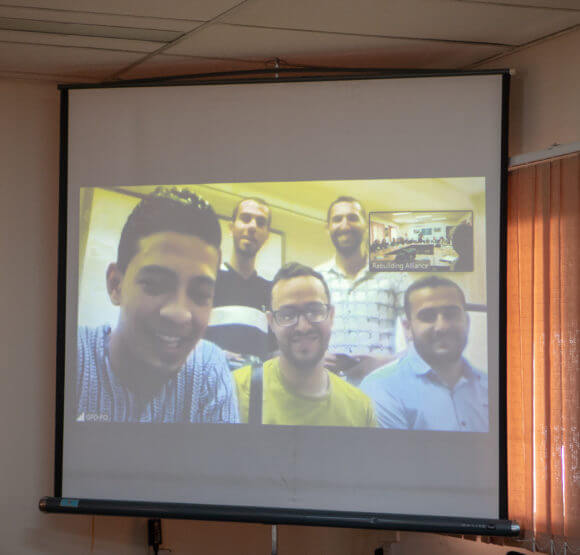


RE: “This spring the Trump administration it has frozen $305 million from its $360 million budget for UNRWA, placing it ‘under review’ while making it clear they should not expect further U.S. funding this year. “ ~ Tom Helman, Joshua Grossman and Peter Klotz-Chamberlin
SEE:
■ “Trump’s Cruel Cuts to Palestinian Refugee Aid”
By Karl Honegger | libertarianinstitute.org | April 14, 2018
▪ I believe the true answer to the defunding of UNRWA lies in the ability of Christian pro-Zionist leaders to make US foreign policy bend to their will.
LINK ➤ https://libertarianinstitute.org/articles/trumps-cruel-cuts-to-palestinian-refugee-aid/
■ “Pro-Israel NGO puts pressure on UNRWA for aiding Palestinian refugees”
by Alex Delmar-Morgan | MiddleEastEye.net | 7 March 2016
▪ Campaign by UN Watch to pressure US to cut $400m funds for UN’s Palestinian refugee agency could have devastating impact on its work
LINK ➤ http://www.middleeasteye.net/news/pro-israeli-ngo-puts-pressure-unrwa-aiding-palestinian-refugees-1755634396
Just in case you aren’t depressed enough:
https://vimeo.com/213851191
It is very bad manners to cross post an article from Counterpunch but this worth serious consideration for those Americans determined to escape the stultifying trap of demonisation
Stanley Cohen, he checked out the real situation..
“I have known well most of its founders and current leadership including those that have either been assassinated or languish, today, in Israeli prisons and elsewhere denied any scrap of justice or due process. Over the years, I have spent literally thousands of hours meeting with movement leaders in prisons, at conferences, in Palestine and elsewhere.
These are virtuous, dedicated, nationalists who seek not power for the sake of it or personal profit but have long stood among those who have fought against overwhelming odds and violence to lead the way toward a Palestinian home built of the marrow of freedom, justice and equality.
Contrary to the Israeli and Western effort to reduce Hamas to a collective of essentially unschooled or unsophisticated foreign born so-called Islamists, nothing could be further from the truth. Hamas is a movement born of Palestine, composed of Palestinians who were raised on the very streets where the blood of their people and families, has been lost to the occupation terror imposed by Israel. For the many who suffer from a now decade old blockade of Gaza–with its lack of food, water, medicine and mobility–Hamas and their families have known the same isolation and paid a like price”
https://www.counterpunch.org/2018/05/22/broken-dreams-and-lost-lives-israel-gaza-and-the-hamas-card/